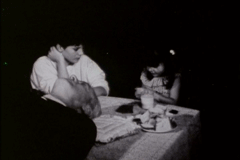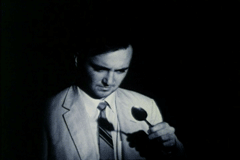|
Newest Reviews:
New Movies -
The Tunnel
V/H/S
The Tall Man
Mama Africa
Detention
Brake
Ted
Tomboy
Brownian Movement
Last Ride
[Rec]³: Genesis
Hara-Kiri: Death of a Samurai
Indie Game: The Movie
Abraham Lincoln: Vampire Hunter
Old Movies -
Touki Bouki: The Journey of the Hyena
Drums Along the Mohawk
The Chase
The Heiress
Show
People
The Strange Affair of Uncle Harry
Pitfall
Driftwood
Miracle Mile
The Great Flamarion
Dark Habits
Archives -
Recap: 2000,
2001, 2002,
2003, 2004
, 2005, 2006,
2007 , 2008
, 2009 ,
2010 , 2011 ,
2012
All reviews alphabetically
All reviews by star rating
All reviews by release year
Masterpieces
Screening Log
Links
FAQ
E-mail me
HOME
| |
The Dead Father
(Guy Maddin) 1986
 Guy Maddin’s The
Dead Father is a superb short film and his first. In only twenty-six
minutes, it etches a portrait of familial strife and neurotic obsession that’s
as poignant as incisive as any that cinema has to offer outside of Bergman. That
flattering description doesn’t exactly do the film justice, however, since it
neglects to mention the stylistic adventurousness and quirky sensibilities that
are found here. Shot in black-and-white, the movie feels like a low budget
50’s era melodrama, complete with minor technical imperfections. The quality
of the picture has been artificially degraded, and the sound fades in and out,
demonstrating an analogue uncertainty. The effect of these stagy flaws becomes
startlingly emotional when the subject matter of the movie is considered. The
film’s unnamed protagonist (designated only as “The Son”) narrates the
film, reminiscing about his deceased father, who wouldn’t quite stay dead when
he was supposed to. Like the work of fellow surrealist David Lunch, Maddin
encapsulates the overbearing presence of the father figure by loading the screen
with 50’s nostalgia. Since the oppressors (fathers) believed in the power of
50’s melodrama to provoke emotion and the power of a peanut butter and jelly
sandwich to nourish, their presence here next to the beleaguered son seems
downright ominous. More than most filmmakers, Maddin has the ability to
recognize the archetypes of cinema and pop culture, and then turn them upside
down and against us in a pointed attack. Guy Maddin’s The
Dead Father is a superb short film and his first. In only twenty-six
minutes, it etches a portrait of familial strife and neurotic obsession that’s
as poignant as incisive as any that cinema has to offer outside of Bergman. That
flattering description doesn’t exactly do the film justice, however, since it
neglects to mention the stylistic adventurousness and quirky sensibilities that
are found here. Shot in black-and-white, the movie feels like a low budget
50’s era melodrama, complete with minor technical imperfections. The quality
of the picture has been artificially degraded, and the sound fades in and out,
demonstrating an analogue uncertainty. The effect of these stagy flaws becomes
startlingly emotional when the subject matter of the movie is considered. The
film’s unnamed protagonist (designated only as “The Son”) narrates the
film, reminiscing about his deceased father, who wouldn’t quite stay dead when
he was supposed to. Like the work of fellow surrealist David Lunch, Maddin
encapsulates the overbearing presence of the father figure by loading the screen
with 50’s nostalgia. Since the oppressors (fathers) believed in the power of
50’s melodrama to provoke emotion and the power of a peanut butter and jelly
sandwich to nourish, their presence here next to the beleaguered son seems
downright ominous. More than most filmmakers, Maddin has the ability to
recognize the archetypes of cinema and pop culture, and then turn them upside
down and against us in a pointed attack.
 The cumulative
effect of Maddin’s combinations of humorous kitsch, dream imagery, and the
grounding reality of family life is absolutely remarkable. The director yields
these modern day totems with the full power that they contain. Lesser directors
like Spielberg simply use those powers at face value when they borrow them, but
Maddin’s mind warps them into something greater than they ever were. That
there’s little here that is remarkable in the way of special effects, visual
flourishes, or quality acting (the son cannot hear his dead father, so the actor
that plays him has no lines) stands as a further testament to the skilled
assurance shown in Maddin’s direction. Without much in the way of the elements
most filmmakers use to move us, Maddin manages to move us anyway. As a result,
the film feels somehow purer than most. The film’s corny music cures are
milked to the max for their comic potential, but they also function
simultaneously on the level that they were originally intended to. Just as the
juxtaposition of the father’s corpse onto the dining room table (a lovely
metaphor, since that’s the center of the nuclear household and the death is
clearly weighing down upon the family’s nerves) riles up our feelings that
things aren’t right here, the cloying music soothes and sympathizes with our
vicarious pain as it rankles us for being so arbitrary, inappropriate, and
insufficient. I could easily go on about Maddin’s accomplishments here.
Surely, a film as densely layered as The Dead Father warrants multiple
close viewings, but its accessible nature and short running time make me think
that such a task might be better left up to the individual.
The cumulative
effect of Maddin’s combinations of humorous kitsch, dream imagery, and the
grounding reality of family life is absolutely remarkable. The director yields
these modern day totems with the full power that they contain. Lesser directors
like Spielberg simply use those powers at face value when they borrow them, but
Maddin’s mind warps them into something greater than they ever were. That
there’s little here that is remarkable in the way of special effects, visual
flourishes, or quality acting (the son cannot hear his dead father, so the actor
that plays him has no lines) stands as a further testament to the skilled
assurance shown in Maddin’s direction. Without much in the way of the elements
most filmmakers use to move us, Maddin manages to move us anyway. As a result,
the film feels somehow purer than most. The film’s corny music cures are
milked to the max for their comic potential, but they also function
simultaneously on the level that they were originally intended to. Just as the
juxtaposition of the father’s corpse onto the dining room table (a lovely
metaphor, since that’s the center of the nuclear household and the death is
clearly weighing down upon the family’s nerves) riles up our feelings that
things aren’t right here, the cloying music soothes and sympathizes with our
vicarious pain as it rankles us for being so arbitrary, inappropriate, and
insufficient. I could easily go on about Maddin’s accomplishments here.
Surely, a film as densely layered as The Dead Father warrants multiple
close viewings, but its accessible nature and short running time make me think
that such a task might be better left up to the individual.
* * * *
02/04/02
Jeremy Heilman
|